Goodbye Earth: Episode 1 (First Impressions)
by solstices
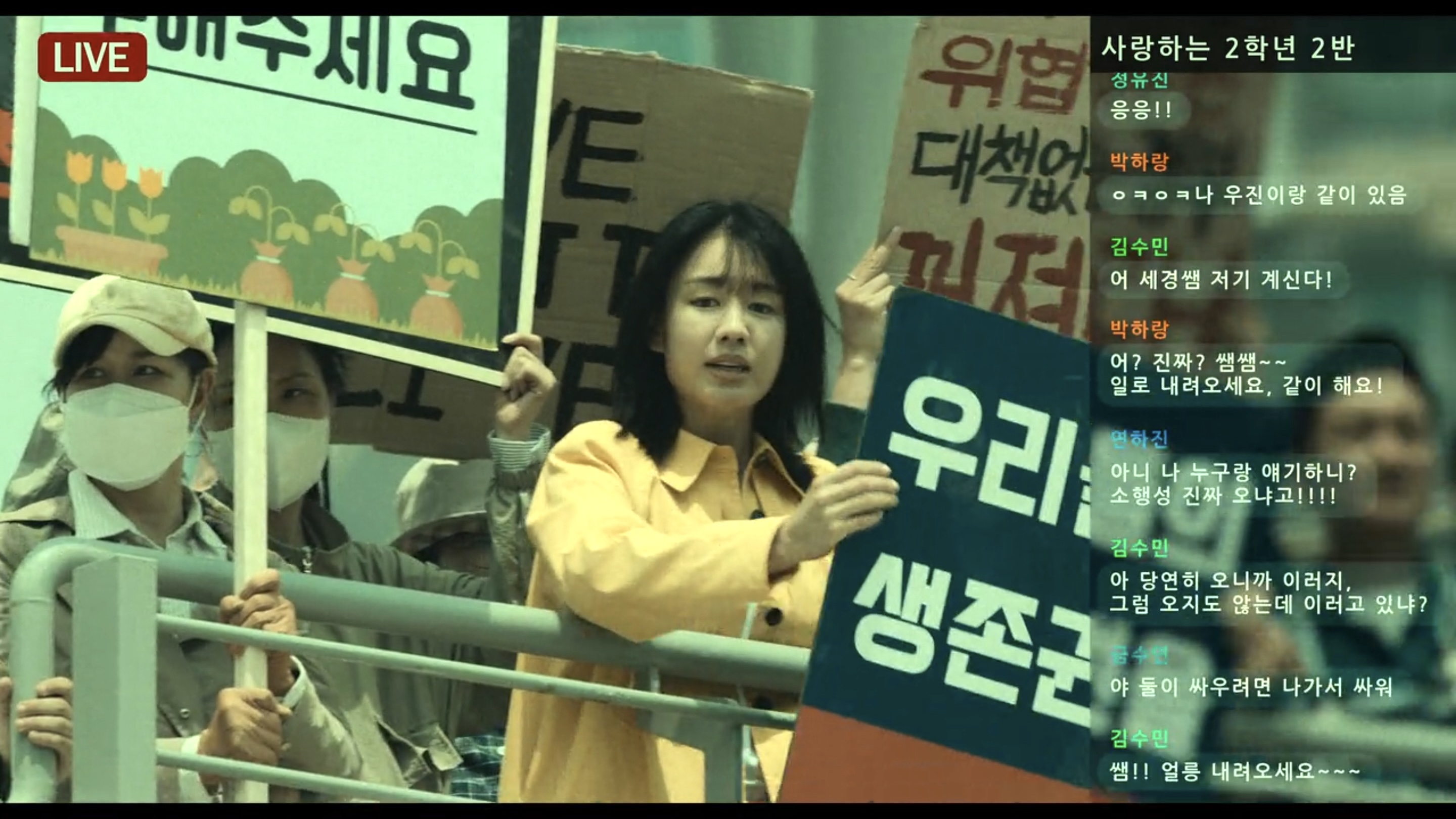
Disorienting and despair-stricken, Goodbye Earth paints its tale of impending destruction in broad strokes as mayhem descends upon the country doomed to be obliterated by a meteorite. Netflix’s latest apocalyptic offering clearly has a hefty budget, but what it has in style and scale it unfortunately lacks in storytelling substance.
Editor’s note: This is an Episode 1 review only. For a place to chat about the entire drama, visit the Drama Hangout.
EPISODE 1
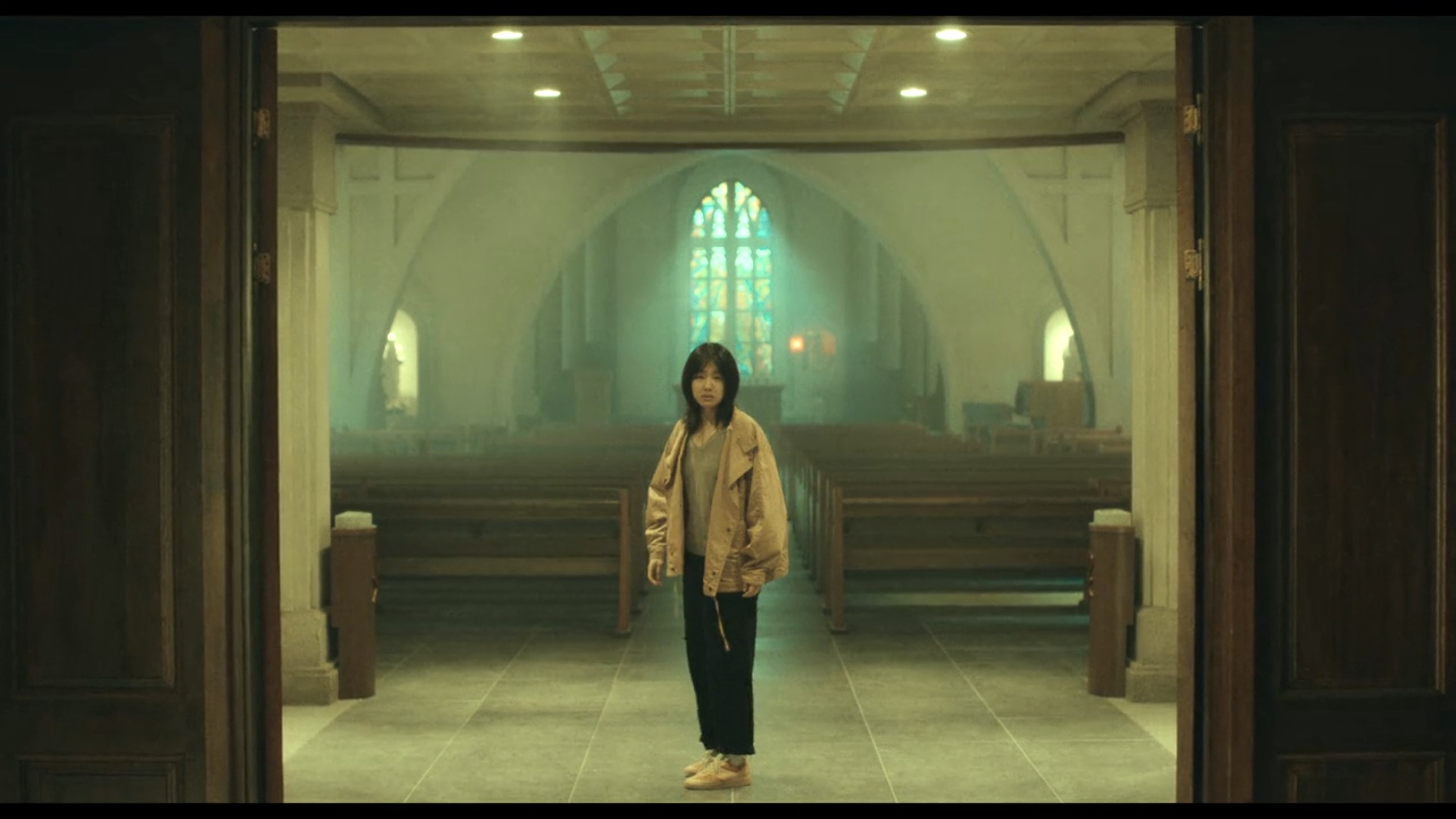
With an intriguing premise and an extensive cast of veteran actors, one would expect Goodbye Earth to have the makings of a disaster epic. Unfortunately, its premiere is undercut by its ambiguous narrative choices. By throwing us headfirst into the action, frequently cutting back and forth between flashbacks and the present day, the drama mirrors the chaos of an impending apocalypse — but its lack of emotional and narrative anchors leaves its viewers adrift as it whisks us from one scenario to another, without sufficient time to develop an investment in the characters and their trajectories.
At the heart of the story is a friend group comprising four very different individuals, with the first episode mainly focusing on the perspective of our protagonist JIN SE-KYUNG (Ahn Eun-jin). As a middle school teacher with an empathetic heart, Se-kyung derives much joy from nurturing the students she cares deeply for. That is, until their idyllic days of normalcy are ripped away from them in an instant. Despite the rapid scientific advancements of 2025 and the invention of space probes meant to prevent this exact scenario, a meteorite is headed straight for Earth — and it’ll strike Korea in three hundred days. Life as people once knew it is no more.
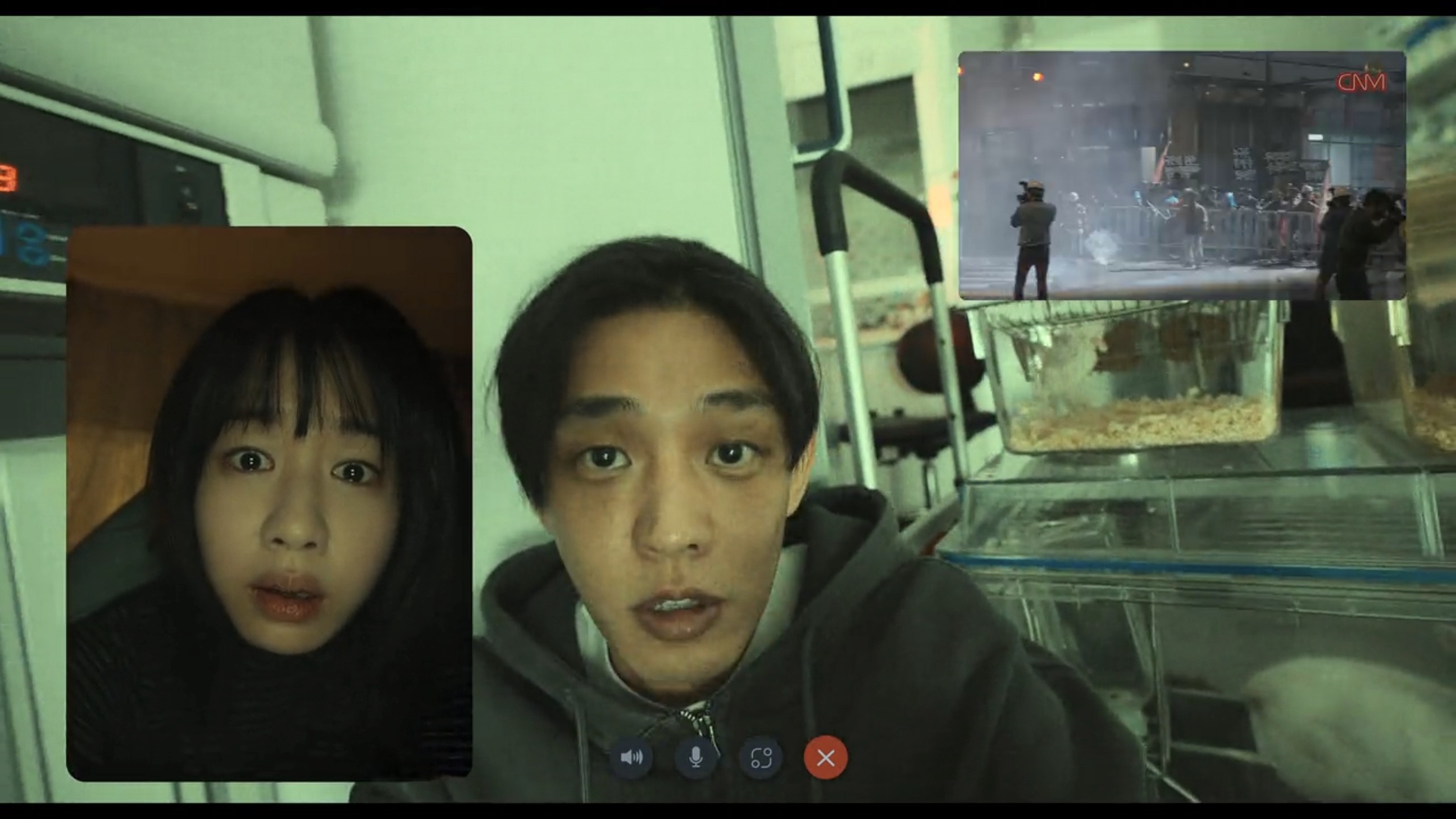
We first meet Se-kyung a hundred days into the disaster response, amidst a panicked flurry of people attempting to flee the country towards safer pastures, before flashbacks contextualize her journey to the current point. For the sake of clarity, though, let’s proceed in chronological order — I’m not averse to nonlinear storytelling, but this drama’s execution is more confusing and less compelling than it should be.
In preparation for the inevitable disaster, the Korean government declares martial law. Worried about her researcher fiancé HA YOON-SANG (Yoo Ah-in) who’s currently working in the States, Se-kyung contacts him through video call. Yoon-sang reassures her that he’ll return soon, showing off the rings he’s gotten for their wedding — but mere seconds later, Se-kyung is forced to watch helplessly on the other side of the screen as hostile parties attack his laboratory. Right before the connection cuts out, Yoon-sang instructs a tearful Se-kyung to seek out FATHER BAEK (Kang Seok-woo).

Heeding his words, Se-kyung heads to the church, but she’s one step too late. The military has set their sights on Father Baek, condemning the congregants’ prayers as an unlawful rally. Despite the protests of the young priest WOO SUNG-JAE (Jeon Sung-woo!!), Father Baek is hauled away by the soldiers, leaving Sung-jae futilely attempting to appease the indignant crowd. All Se-kyung can do is push past Sung-jae to run into the empty church, where she was to be wed, as a hapless sorrow sinks into her weary countenance.
Meanwhile, the seeds of unrest have been germinating, and they manifest in public rallies, conspiracy theories, and reckless behavior. A jailbreak culminates in an outright riot on the streets, with the ex-prisoners kidnapping vans full of middle school students. By the time the authorities track them down, most victims have already been killed, leaving nothing but piles of shoes for their bereaved parents to weep over.
Both these scenes ought to be gut-wrenching, but they fell somewhat flat for me. We barely get to know Yoon-sang before he’s wrenched away, so it’s difficult to form any attachment to his character or Se-kyung’s longing. As for the prisoners’ rampage, it unfolded so quickly and in such a streamlined manner that it inadvertently created a sense of detachment — you know you’re witnessing an awful atrocity, but you just can’t feel it viscerally.
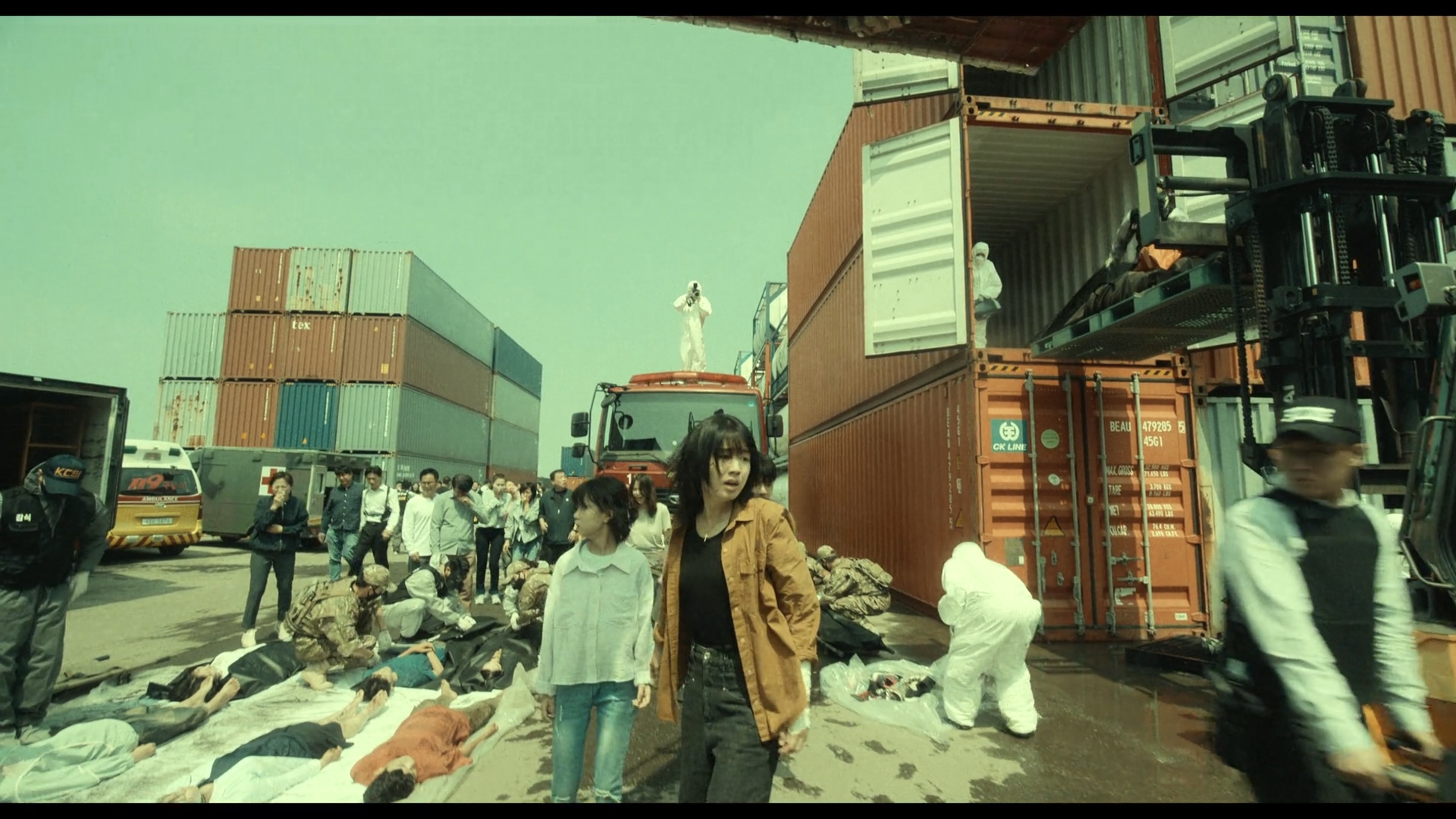
Fast forward to 201 days before the meteor strike, and Se-kyung is bidding goodbye to her student JUNG HA-YUL (Kim Do-hye), who was a survivor of the trafficking tragedy. Ha-yul’s family is part of the crowd seeking refuge in other countries, and she stuffs a letter into Se-kyung’s backpack before she departs. Except she doesn’t actually leave after all, because her father JUNG SOO-GEUN (Park Hyuk-kwon) gets flagged by the embassy, forcing them to stay behind.
Ha-yul’s letter contains information about her captors — some time ago, new neighbors had moved in next door, bringing fancy cars and loud music with them. Amongst them had been the man who murdered Ha-yul’s classmates. Appalled, Se-kyung conveys the information to her soldier friend KANG IN-AH (Kim Yoon-hye), hoping she can enact justice on their behalf.


Unfortunately, In-ah’s hands are tied. Her unit barely has any power, and the firearms they carry around are unloaded due to insufficient ammunition. Worse yet, In-ah isn’t in the military’s good books. After her defiance of orders had led to an explosion, her superior Park Ho-san took the blame and got discharged in her stead. The burn scars on his neck are the mark of In-ah’s guilt.
Without any other avenue of recourse, Se-kyung decides to take matters into her own hands. She’s been training her physique and honing her knife-throwing skills, and she sneaks into the murderer’s house for revenge. Except he’s already dead by the time Se-kyung gets there — she’s just chloroformed a corpse — and she flees, terror racing through her veins.
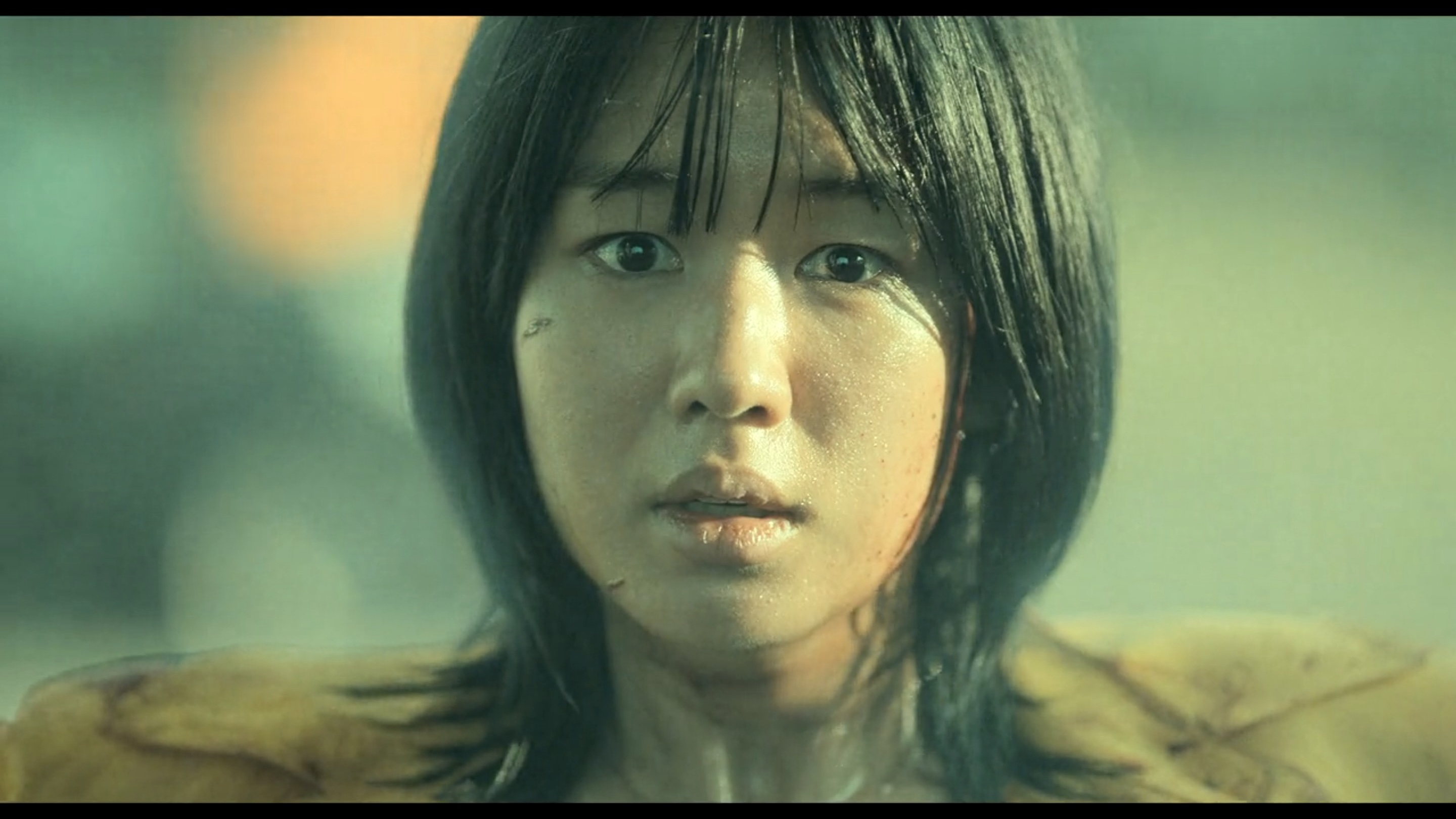
Perhaps what frustrates me most about this premiere is its untapped potential that it only briefly skims past. With an inevitable annihilation looming, the doomed citizens’ reactions run the gamut of emotions — from the ones who hopelessly bemoan their end, to the ones who brashly live the last spurt of their lives to the fullest. There’s much conflict to be mined from these ideological differences; instead, these reactions are scattered and brief, and the breakneck plot barely gives them the time to breathe and expand.
So far, Se-kyung is the link that connects the other three legs of our friendship quartet, as well as the central figure rallying lost kids under her wings. Her precocious protégés PARK JIN-SEO (Kim Kang-hoon) and YOO SO-MIN (Kim Bo-min) aren’t particularly noteworthy just yet, apart from their opportunistic enterprise of selling videos amidst the internet outage, but their relevance to the plot will likely grow as episodes progress.
My curiosity lies mostly with our eclectic square of protagonists — the combination of a teacher, a researcher, a priest, and a soldier is a fascinatingly odd one, and I wonder how they rallied together in the first place. There’s a tight-knit bond obscured by the dire straits that have descended upon them, and it remains to be seen whether their rapport will hold true — or if the apocalypse will tear them apart.
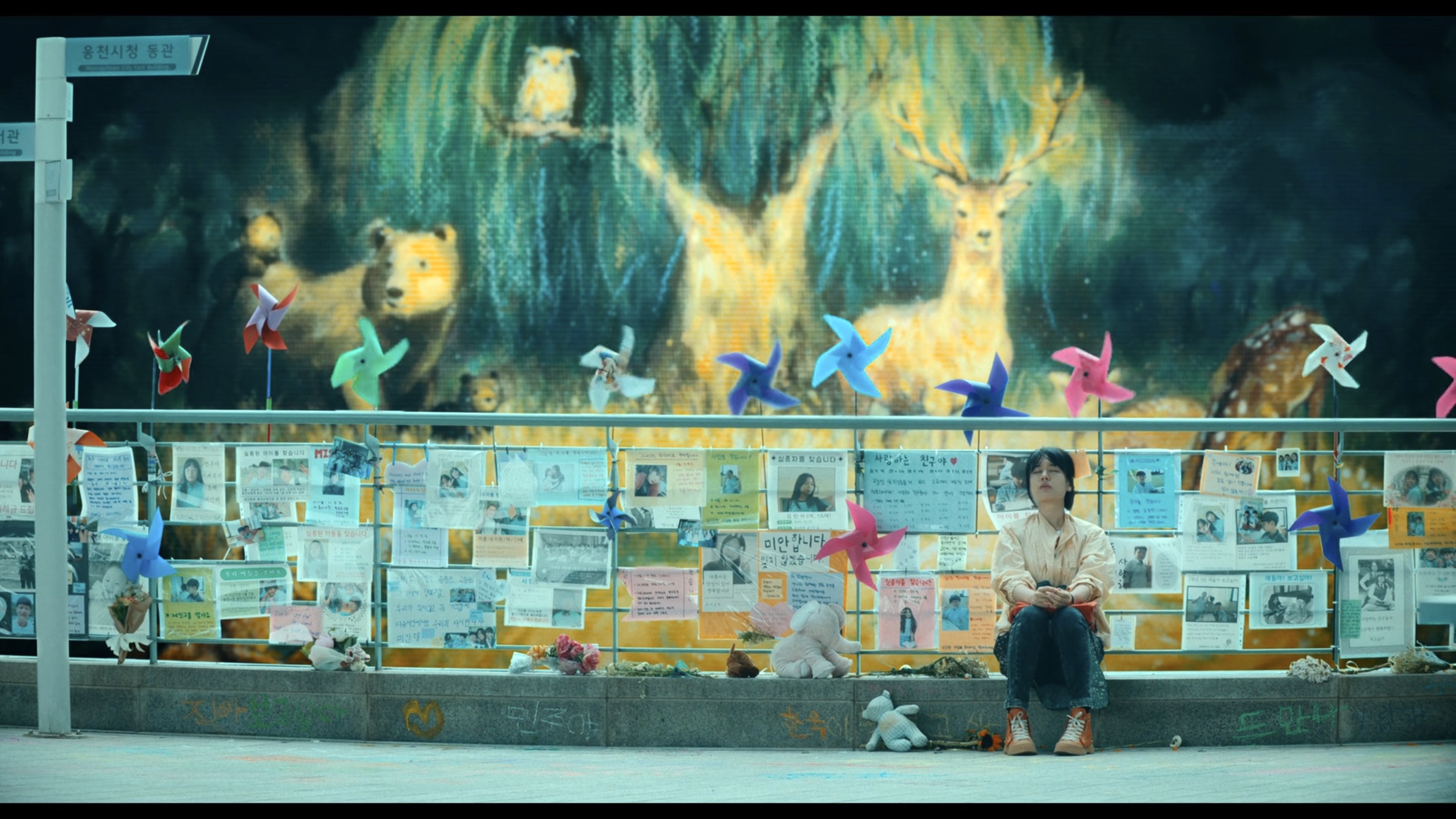
RELATED POSTS
Tags: Ahn Eun-jin, First Impressions, Goodbye Earth, Jeon Sung-woo, Kim Kang-hoon, Kim Yoon-hye, Yoo Ah-in

![[Beanie Recs] Feel-good fantasy?](https://d263ao8qih4miy.cloudfront.net/wp-content/uploads/2022/05/BeanieRecs.jpg)


![[Beanie Review] A Virtuous Business](https://d263ao8qih4miy.cloudfront.net/wp-content/uploads/2024/10/AVirtuousBusiness_reviewb.jpg)





Required fields are marked *
Your email address will not be published. Required fields are marked *
1 DancingEmma
April 27, 2024 at 11:51 PM
Thanks for this @solstices.
The decision to re-edit to reduce amap Yoo Ahin’s role has probably played havoc with the narrative cogency. I understand the difficulty in resisting the collective pressure to shun and demonise Yoo Ahin even if I find it a public policy failure and cruel to boot. But how could the artistic integrity of any work be maintained in the face of such a clusterfuck?
Required fields are marked *
2 Britney
April 27, 2024 at 11:57 PM
I'm sure it makes sense in context but reading just the weecap left me confused why a jailbreak led to a van or multiple vans with kids was taken and then they were killed. Were the kids supposed to hostages? Then why kill them? Did the escapees also die?
Required fields are marked *
emsel
April 28, 2024 at 12:00 AM
Maybe they were going with the approach of humanity is dead and earth deserves to be destroyed?
Required fields are marked *
panshel
April 28, 2024 at 6:48 PM
It's briefly mentioned in the review, but the prisoners kidnapped the kids for human trafficking. They did beat the kids -- some to death -- but the kids were locked in a shipping container to be trafficked and likely died from heat exhaustion or starvation. The escapees did not die, which is a major plot point for the drama.
Required fields are marked *
3 emsel
April 27, 2024 at 11:57 PM
@solstices Thank you for 1st impression.
Ep 1 gave me headache from trying to make sense of the super bad editing and disjointed narration. I know 1 hr isn't enough to set up the characters, but the story doesn't have show desperation or hope to survive the destruction. It rather gives a feeling of "The sooner the asteroid strikes, the sooner this will all end".
Required fields are marked *
4 antonio83
April 28, 2024 at 12:10 AM
I can bet it's funded by Netflix without even watching a minute of it.
I hope that the narrative and stories we watch every day from China or Korea do not become corrupted. To those who defend Western shows I always say if they can name me a recent good film or TV series to watch: total silence.
Required fields are marked *
Charlotte
April 28, 2024 at 8:02 PM
So true. Nice to know I'm not alone in this view. The 'netflix-washing' of Korean dramas has increased in the past two years, as if american viewers aren't smart enough to follow or be interested in another country's culture unless they're dressed up in western themes and psychology, (think cynicism, horror, zombies and serial killers). Many of us left all that behind when we found K-dramas and there was great rejoicing when Netflix began buying them. But then all those lucrative Netflix sales slowly began infecting Korean content producers who started to tailor their Korean stories to fit an american algorhythm that would also work globally. Just my viewpoint of course since I began watching in 2015, but these subtle choices in themes, style and even casts (ie: so many kpop idols instead of actors) are effectively corrupting the essence of the Korean Drama that we've been streaming from other platforms...all made in Korea without the foreign influence of outside $$$. I know that change is the spark of creativity in art & society, but when only one country's dominant perspective holds the financial reigns globally, then the cultural content & quality of each country's stories are muted. I've noticed this too from other countries. I just clicked through Netflix's line-up of International TV series...Swedish, Spanish, East Indian & Italian...but somehow the tone and themes seem the same. However, the bottom line is, when it comes to having the dollars to buy the BIG HITS coming out of Korea, Netflix wins all the time (ie: Extraordinary Attorney Woo, Queen of Tears & Crash Landing on You). A big plus for international viewers. But for so many of their other dramas now, the Netflix Korean 'spark' just isn't sparking for me anymore. The apocalyptic outline of 'Goodbye Earth" is already big over here and nothing about this one seems to be a fresh take on this topic. A pass for me. (sorry about the netflix rant...it's been building up... 🤦🏻♀️)
Required fields are marked *
antonio83
April 28, 2024 at 11:52 PM
Of course you're not the only one. I imagine you live in the West, like me. I recommend you to watch more Cdramas. I also started with Kdrama in 2020, but from 2022 I watch at least 80% Cdrama. The reasons why Western culture is in decline are many and you have guessed some of them. In my opinion, however, the most devastating reason for the decay of the West is the anti-human, anti-family culture that permeates everything. In particular, we want to represent a world in which femininity and masculinity no longer exist. It may seem absurd to Western readers, but today the most beautiful female figures are found in Kdramaland and Cdramaland (I'm thinking of Mother, My Ahjussi, The story of Xing Fu, Love Like the Galaxy...). Same goes for men.
Another weakness of the West is that unhealthy models are almost always shown (thieves, traitors, murderers are often protagonists). Another paradox is that atheist China shows us characters with strong morality in a positive light, the exact opposite of what happens in the West. Asian stories are food for the soul, at least for me.
Required fields are marked *
5 Diana Hansen
April 28, 2024 at 4:17 PM
I was as lost and confused as all those refugee type people on earth there! I want to watch it but I might have to drop it if episode 2 doesn't give me enough to want to keep watching---
Required fields are marked *
6 FormAnOrderlyQueue
April 28, 2024 at 11:57 PM
It meandered all over the place (and it doesn't stop - I'm at ep7 and about to throw in the towel). Where's it going? I'm not sure the writer, director, actors or anyone knows. I wouldn't be surprised if the meteor itself suddenly finds itself meandering...
Required fields are marked *
7 jarchibald
April 29, 2024 at 4:24 PM
Tried watching episode 1 but it was hard to follow. The sequences are all over the place that you really cannot get a hold of the story.
Required fields are marked *